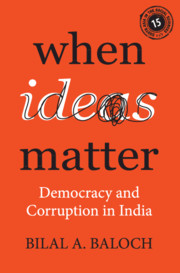Book contents
- Frontmatter
- Dedication
- Contents
- List of Table
- Preface
- Acknowledgments
- List of Abbreviations
- 1 Introduction
- 2 A Constructivist Approach to Political Behavior in India
- 3 The Emergency and the Jayaprakash Narayan Movement
- 4 India under Gandhi: Populism and Partisans
- 5 Checks and Balances and the India Against Corruption Movement
- 6 United Progressive Alliance: Technocrats and Transformations
- 7 The Politics of Ideas in India and Developing Democracies
- Appendices
- Bibliography
- Index
7 - The Politics of Ideas in India and Developing Democracies
Published online by Cambridge University Press: 30 June 2021
- Frontmatter
- Dedication
- Contents
- List of Table
- Preface
- Acknowledgments
- List of Abbreviations
- 1 Introduction
- 2 A Constructivist Approach to Political Behavior in India
- 3 The Emergency and the Jayaprakash Narayan Movement
- 4 India under Gandhi: Populism and Partisans
- 5 Checks and Balances and the India Against Corruption Movement
- 6 United Progressive Alliance: Technocrats and Transformations
- 7 The Politics of Ideas in India and Developing Democracies
- Appendices
- Bibliography
- Index
Summary
Every man, wherever he goes, is encompassed by a cloud of comforting convictions, which move with him like flies on a summer day.
—Bertrand Russell, 1928The Politics of Ideas in India: Past and Present
One of the main goals of my project has been to show that elite ideas need to be taken seriously. This much may seem obvious when we discuss and write about government behavior in the developed world, but once we interrogate the leading monographs and theories on government decision-making in India and other developing contexts, ideas are given little to no sway. I have also sought to go deeper, by exploring where ideas come from, how they might be chosen, and when they are the most salient for explaining political behavior. This book therefore provides a useful balance to the current comparative work on Indian politics and political economy. To illustrate, I have argued that government response to a credibility crisis, as evidenced by decision-makers’ treatment of a nationwide anti-corruption movement, is conditioned by the interaction between the ideas of state elites and political and state structures. Ultimately, we observe ideas play out in two ways in the empirical analysis. The first is through activating populism and the second is through an ideational checks and balances mechanism.
The number of populists in power have increased fivefold since 1990, with a firm anchoring in distinct concepts of the nation. Whereas populism was once found primarily in developing democracies, populists, and their visions of the nation, are increasingly gaining power in systemically developed institutional contexts too. Consider the words of US Attorney General William P. Barr during a closed-door speech at the University of Notre Dame on October 11, 2019: “Secularists, and their allies among the ‘progressives,’ have marshalled all the force of mass communications, popular culture, the entertainment industry, and academia in an unremitting assault on religion and traditional values.” On the same day, around 450 miles south in Nashville, Tennessee, Secretary of State Mike Pompeo gave a speech on “Being a Christian Leader” at the American Association of Christian Counselors. The event was showcased on the State Department's homepage all week.
- Type
- Chapter
- Information
- When Ideas MatterDemocracy and Corruption in India, pp. 227 - 257Publisher: Cambridge University PressPrint publication year: 2021



